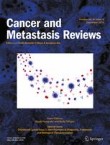
Abstract
One of the mechanisms potentially explaining the discrepancy between the number of human genes and the functional complexity of organisms is generating alternative splice variants, an attribute of the vast majority of multi-exon genes. Members of the RAS family, such as NRAS, KRAS and HRAS, all of which are of significant importance in cancer biology, are no exception. The structural and functional differences of these splice variants, particularly if they contain the canonical (and therefore routinely targeted for diagnostic purposes) hot spot mutations, pose a significant challenge for targeted therapies. We must therefore consider whether these alternative splice variants constitute a minor component as originally thought and how therapies targeting the canonical isoforms affect these alternative splice variants and their overall functions.
Δεν υπάρχουν σχόλια:
Δημοσίευση σχολίου
Σημείωση: Μόνο ένα μέλος αυτού του ιστολογίου μπορεί να αναρτήσει σχόλιο.